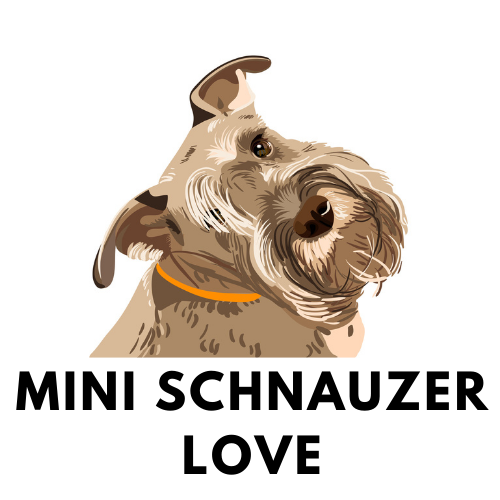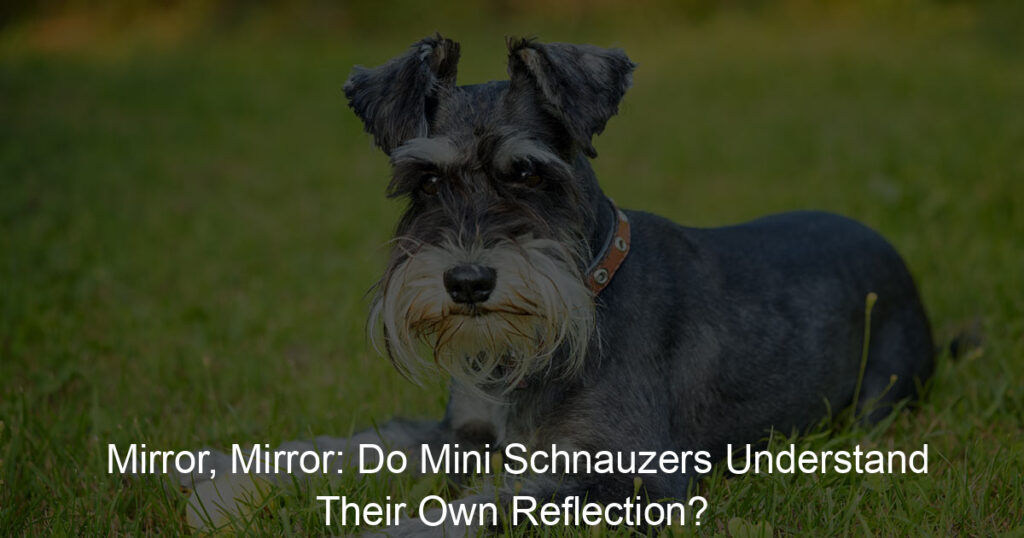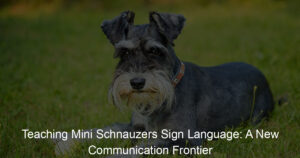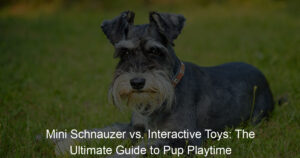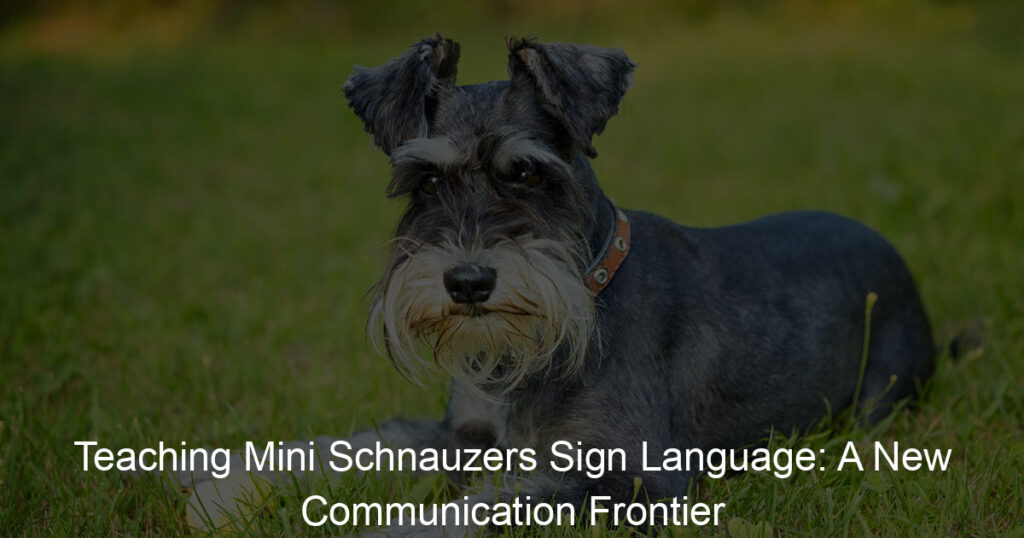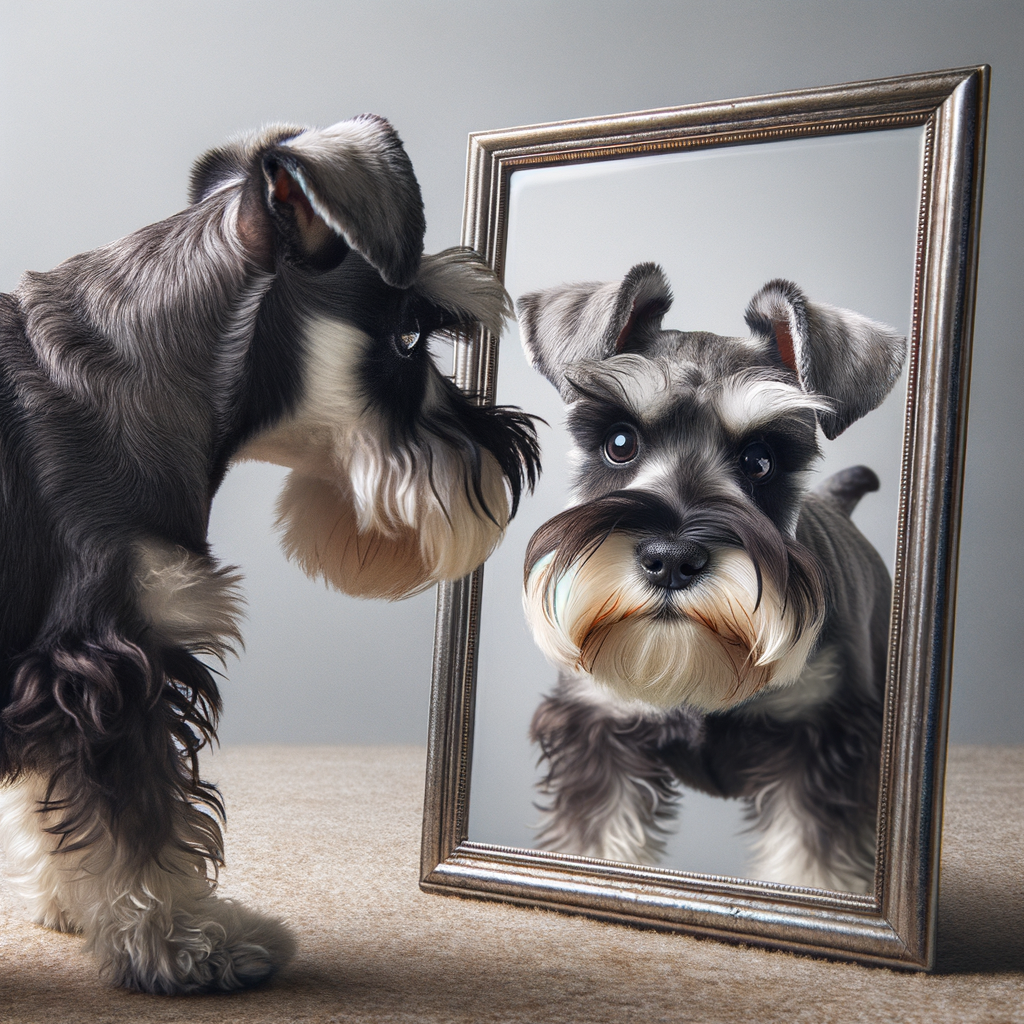
Introduction to Mini Schnauzers and Self-Awareness
When it comes to understanding our furry friends, it’s essential to delve into their behavior and self-awareness. In this blog post, we will focus on Miniature Schnauzers, a breed known for its distinctive looks and lively personality.
- Overview of Miniature Schnauzer behavior
Miniature Schnauzers are known for their alert and friendly nature. They are intelligent dogs, quick to learn new commands and tricks. They are also known for their strong protective instincts, making them excellent watchdogs. Despite their small size, they are fearless and often believe they are much larger than they are.
- Understanding dog behavior: A general perspective
Dog behavior is a complex subject that involves understanding their instincts, training, and environment. Dogs communicate through a variety of signals such as body language, vocalization, and even scent. They are social animals, and their behavior is often a reflection of their relationship with their human family and other animals.
- Defining self-awareness in dogs
Self-awareness in dogs refers to their ability to recognize themselves as separate from their environment and other beings. It involves understanding that they have a body that they can control and that their actions have consequences. This concept is often tested through the mirror test, where a dog is shown its reflection to see if it recognizes itself. However, it’s important to note that not all dogs will pass this test, and it doesn’t necessarily mean they lack self-awareness.
As we delve deeper into the world of Mini Schnauzers and their self-awareness, we will explore the fascinating subject of canine self-recognition, the mirror test, and what it all means for our understanding of these wonderful pets.
Canine Self-Recognition: A Closer Look
When we gaze into the eyes of our beloved dogs, we often wonder what they are thinking. Do they recognize themselves? Do they understand their own existence? Let’s delve into the fascinating world of canine self-awareness.
Studies on Canine Self-Awareness
Over the years, scientists have conducted numerous studies to understand the depth of a dog’s self-awareness. These studies have ranged from historical research to recent experiments involving mirrors.
- Historical Studies on Canine Self-Awareness
- Recent Research on Dogs Recognizing Themselves in Mirrors
Historically, the concept of self-awareness in dogs was largely unexplored. Early researchers believed that dogs, like most animals, lacked the cognitive ability to recognize themselves. However, as time passed, this perception began to change. In the 1970s, a series of studies suggested that dogs might indeed possess a certain level of self-awareness. These studies focused on observing dogs’ reactions to their reflections in mirrors, their ability to follow their own scent, and their responses to recorded sounds of their own barking.
In recent years, the focus has shifted towards understanding if dogs can recognize themselves in mirrors. This is known as the ‘Mirror Test’. While dogs don’t rely on vision as much as humans do, these studies have provided some interesting insights. For instance, a 2017 study found that dogs showed signs of self-recognition when they saw their reflection in the mirror. They exhibited behaviors such as turning their heads and sniffing the air, indicating that they recognized the image in the mirror as themselves.
While the research is still ongoing, these studies suggest that our canine friends might have a deeper understanding of themselves than we previously thought. As we continue to explore the fascinating world of canine cognition, we can look forward to more insights into the minds of our beloved pets.
Can Dogs Recognize Their Reflection?
One of the most intriguing questions in the world of canine cognition is whether dogs can recognize their reflection. This question has been the subject of numerous studies and experiments, with varying results. Let’s delve into this topic and explore the fascinating world of canine self-recognition.
- Understanding the Canine Mirror Test
- Examples of Dogs Reacting to Their Reflection
The mirror test, first developed by psychologist Gordon Gallup Jr. in 1970, is a method used to determine whether an animal possesses the ability of self-recognition. The test involves placing a mark on an animal’s body in a place that can only be seen in a mirror. If the animal looks in the mirror and then tries to remove the mark, it’s considered an indication of self-recognition.
However, this test has its limitations when it comes to dogs. Dogs primarily rely on their sense of smell rather than sight, which makes the mirror test less effective for them. While some dogs may show interest or curiosity when they see their reflection, it doesn’t necessarily mean they recognize themselves.
Many dog owners have observed their pets interacting with mirrors. Some dogs may bark or wag their tails, while others may ignore the reflection completely. These reactions can be quite entertaining, but they don’t provide a clear answer to the question of self-recognition.
For instance, a dog might bark at its reflection because it perceives it as another dog. On the other hand, a dog that ignores its reflection may simply understand that the “other dog” in the mirror doesn’t smell like a real dog, and therefore isn’t a threat or a potential playmate.
In conclusion, while it’s clear that dogs react to their reflection in some way, it’s still a matter of debate whether they truly recognize themselves. More research is needed in this area to fully understand the extent of dogs’ self-awareness and cognitive abilities.
Mini Schnauzers and the Mirror Test
One of the most fascinating aspects of Mini Schnauzers is their ability to recognize themselves in the mirror. This section will explore this phenomenon in more detail, focusing on the unique personality traits of Mini Schnauzers and how these traits might influence self-recognition.
Mini Schnauzer Personality Traits and Self-Recognition
Mini Schnauzers are known for their distinctive personality traits. These traits not only make them lovable companions but may also play a role in their ability to recognize themselves in the mirror.
- Unique personality traits of Mini Schnauzers
- How these traits might influence self-recognition
Mini Schnauzers are known for their intelligence, curiosity, and boldness. They are quick learners, always eager to explore their surroundings and are not easily intimidated. These traits make them unique among other dog breeds.
The intelligence of Mini Schnauzers might contribute to their ability to pass the mirror test. Their curiosity could lead them to investigate their reflection, while their boldness might prevent them from being scared off by their own image. However, it’s important to note that not all Mini Schnauzers will react the same way to a mirror, as individual personalities can vary.
In conclusion, the unique personality traits of Mini Schnauzers, such as their intelligence, curiosity, and boldness, might play a role in their ability to recognize themselves in the mirror. However, more research is needed to fully understand this intriguing aspect of Mini Schnauzer behavior.
Case Studies: Mini Schnauzers and the Mirror Test
Let’s delve into some fascinating case studies that explore how Mini Schnauzers interact with mirrors. These studies provide valuable insights into the self-recognition abilities of these adorable canines.
-
Case Study 1: Mini Schnauzer’s Reaction to Mirror
In this case study, a 2-year-old Mini Schnauzer named Max was introduced to a full-length mirror for the first time. Initially, Max displayed curiosity, sniffing the mirror and trying to look behind it. Upon seeing his reflection, Max barked and wagged his tail, seemingly perceiving the image as another dog.
Over the next few minutes, Max’s reaction changed. He stopped barking and began to study his reflection more intently. This shift in behavior suggests that Max might have started to recognize the reflection as his own, indicating a level of self-awareness.
-
Case Study 2: Mini Schnauzer’s Behavior with Mirror Over Time
This case study followed a Mini Schnauzer named Bella over a period of six months. Bella was exposed to a mirror daily, and her reactions were carefully observed and recorded.
Initially, Bella reacted similarly to Max, showing curiosity and confusion. However, over time, Bella’s reactions to the mirror diminished. She would occasionally glance at the mirror but no longer showed signs of seeing it as another dog. This change suggests that Bella had learned to recognize her own reflection, demonstrating a degree of self-recognition.
These case studies provide compelling evidence that Mini Schnauzers, like many other dog breeds, are capable of self-recognition to some extent. However, more research is needed to fully understand the depth of their self-awareness.
Key Takeaways: Do Mini Schnauzers Understand Their Own Reflection?
-
Summary of research findings:
Research on canine self-recognition has yielded interesting results. While dogs, including Mini Schnauzers, do not pass the traditional mirror test used to measure self-awareness in animals, this does not necessarily mean they lack self-awareness. Dogs primarily use their sense of smell rather than sight to understand the world around them. Therefore, a mirror test may not be the best measure of self-recognition for dogs.
-
Implications for understanding Mini Schnauzer behavior:
Understanding that Mini Schnauzers, like other dogs, rely heavily on their sense of smell can help us better understand their behavior. If your Mini Schnauzer seems to ignore their reflection, it’s not because they don’t recognize themselves. It’s simply that the mirror doesn’t smell like them. This understanding can help us better communicate with and train our Mini Schnauzers.
-
Practical tips for Mini Schnauzer owners:
Knowing that your Mini Schnauzer uses their sense of smell to understand the world can be used to your advantage. For example, if you’re training your Mini Schnauzer, using scent-based rewards may be more effective than visual ones. Also, if your Mini Schnauzer seems to be acting strangely around mirrors, remember that they might just be confused because their reflection doesn’t smell like them.
Further Research and Conclusion
As we delve deeper into the fascinating world of canine self-awareness, there are still many areas that require further exploration. Let’s take a look at some of these areas and conclude with our final thoughts on Mini Schnauzers and self-recognition.
- Areas for further research in canine self-awareness
While we have made significant strides in understanding canine self-awareness, there is still much to learn. Here are a few areas that could benefit from further research:
- Age and Self-Awareness: Do puppies recognize themselves in the mirror, or is this an ability that develops with age? Further research could help us understand the developmental timeline of self-awareness in dogs.
- Breed Differences: Are there differences in self-recognition abilities among different breeds? We’ve focused on Mini Schnauzers in this article, but what about other breeds?
- Training and Self-Awareness: Can training enhance a dog’s self-recognition abilities? This could be a fascinating area for future studies.
- Final thoughts on Mini Schnauzers and self-recognition
Mini Schnauzers, like many other dogs, show signs of self-recognition, but it’s not as clear-cut as it is in humans. They may not pass the mirror test, but they demonstrate self-awareness in other ways, such as through their social interactions and their ability to learn from past experiences.
It’s important to remember that dogs perceive the world differently than we do. They rely more on their sense of smell and hearing than on their vision. So, while they may not recognize themselves in a mirror, that doesn’t mean they lack self-awareness.
In conclusion, while there’s still much to learn about canine self-awareness, it’s clear that our furry friends are more self-aware than we might initially think. And as for Mini Schnauzers, they continue to surprise and delight us with their intelligence and unique personalities.
